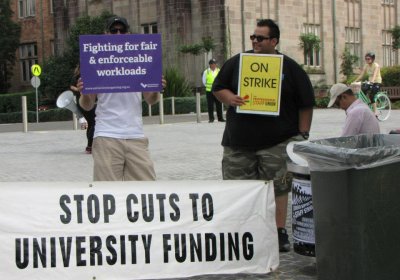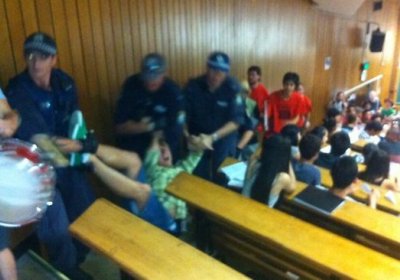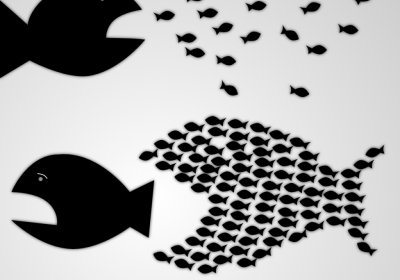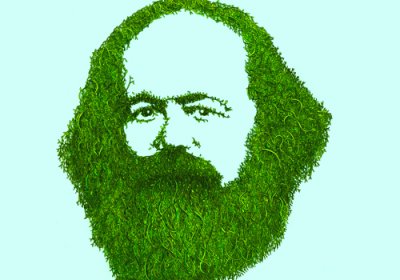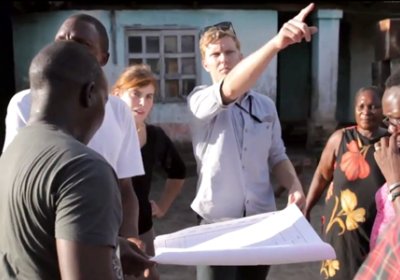The federal Labor government has announced it intends to dramatically increase funding to primary and high school education as part of the Gonski reforms. But before you think that maybe, just maybe, the government might be making some policy that could be defended by progressives, there's a devil in the detail.
Ben Peterson
The National Tertiary Education Union (NTEU) at the University of Sydney is involved in an industrial battle with the administration over pay, conditions and casualisation.
As part of this campaign, the union held a 24-hour strike on March 6. Staff and students held pickets outside all campus entrances, and the university was largely shut down for the day.
The multiple picket lines converged on the main entrance to the university for a midday rally, which attracted hundreds of staff and supporters. There were many speakers including unionists, student representatives and the Greens.
Sydney University staff have successfully shut down campus as part of their ongoing enterprise bargaining campaign today (March 26). The two-day strike, by members of the National Tertiary Education Union and Community and Public Sector Union, is continuing tomorrow.
This week on campuses across the country, Resistance members are opening their books and getting back into study. Our “Bachelor of Revolutionary Activism” will be open to anyone who is interested in getting an education in socialist ideas.
Classes will include a discussion on Marxist-feminism. Others will be about how we can save our environment, or how best to support the Palestinian people. It’s a little bit different in each city or campus, but there will be common themes. Everywhere Resistance will be putting forward an alternative vision on how to run the world.
Important rallies were held across the country in defence of the single parent payment on February 5. After having the welfare safety net in Australia for some time, it seems insane there is a need to protest to protect such rights.
But protests like these made welfare a reality in the first place. These protests are defending an unprecedented attack, it's a return to the action that made social welfare possible.
To do so, it is important to understand the reason that welfare is under attack in the first place.
National protests have been held around the country to oppose changes to welfare payments for sole parents. The federal Labor government is forcing parents to switch to the Newstart allowance once their youngest child turns eight, leaving parents up to $140 a fortnight worse off.
A new group, the Single Parents Action Group (SPAG), coordinated protests across the country on February 5. Rallies took place in every state and territory.
The federal government has begun “trials” of a controversial new plan for compulsory income management in five places around Australia. This policy began in the Northern Territory as part of the "NT intervention" in 2007, but is now expanding into other states and territories.
What is solidarity? It is a term used frequently on the left, and one that demands attention. Solidarity refers to an act or expression of mutual support among a group of people. However, capitalism can narrow the parameters of solidarity and weaken its collective power to acts of individualism.
The world today is plagued by many crises. Economies are in recession. The world is wracked by war. And poverty is still rampant for the world's majority. Alongside all of this, our environment, and our climate, is increasingly under pressure, threatening all life on the planet.
The climate crisis strikes at the very heart of our societies. We need to question the way we operate, the way we allocate and use our resources, and the way we develop infrastructure, so that we can create a more sustainable world.
The Victorian Coalition government has taken to the state with a razor and announced huge cuts in the 2012 budget. These are the biggest cuts since the Jeff Kennett-led Coalition government that ruled Victoria from 1992-1999.
Victorian TAFE institutes in particular will be hard hit. The level of cuts was so severe that higher education minister Peter Hall sent a letter to TAFE heads on April 29 indicating that he had considered resigning from the ministry.
The Victorian Liberal government has taken to the state’s public sector with a razor blade and announced huge cuts in the 2012 budget.
Victorian TAFE institutes in particular will be hard hit. GippsTAFE chief executive officer Peter Whitely told ABC Radio that his institute faces a loss of 10% of its operating budget. TAFE courses that are not in high demand are expected to be slashed.
A telling quote in the film KONY 2012 says: “Who are you to stop a war? — the question is, who are you not to?” I think the question that the people behind KONY 2012, which went viral on the internet on March 7, need to be asked is: “Who are you to start one?” Joseph Kony, the leader of the Lord’s Resistance Army in eastern Africa, is a bad man.
- Previous page
- Page 2
- Next page
